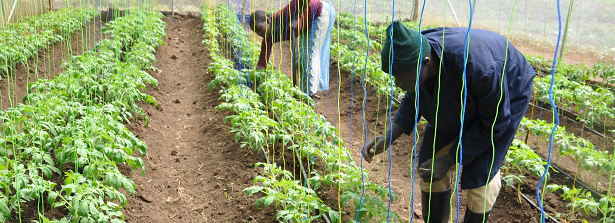“Towards a World Without Hunger in 2030: the Dutch contribution”

The Policy letter of May 2019 from the Minister for Foreign Trade and Development Cooperation and the Minister of Agriculture, Nature and Food Quality to the House of Representatives on “Towards a World Without Hunger in 2030: the Dutch contribution” is now available in English.
Global food security has been a major policy goal for the Netherlands for more than a decade, in accordance with policy letters submitted to the House in 2008, 2011 and 2014. The 2019 letter sets out how the government is continuing its work on this topic within the framework of the revised policies on foreign trade and development cooperation and agriculture. It examines the current situation as regards global food security, identifies the Netherlands’ strengths and sets priorities for an effective Dutch contribution towards achieving a future without hunger.
- Follow this link to download the English version of the policy letter “Towards a World Without Hunger in 2030: the Dutch contribution”.
- Volg deze link voor de Nederlandse versie van de Kamerbrief “Op weg naar een wereld zonder honger in 2030: de Nederlandse inzet”.
Consensus on goals, systemic action
In 2015 the world agreed to tackle 17 major challenges for sustainable development. The Sustainable Development Goals (SDGs) provide the basis for the Dutch government’s approach which is set out in the policy document “Investing in Global Prospects”. SDG2 aims to end hunger and malnutrition and raise the productivity of small-scale food producers and food systems – land-based and marine – in a way that contributes to the preservation of ecosystems, enhances resilience to climate change and improves land and soil quality. There is growing global awareness that parts of SDG2 (nutrition, agriculture and ecological sustainability) are interdependent, and that they form a coherent whole with the other 16 SDGs.
The SDGs are also an agenda for innovation and development, and offer the private sector opportunities to explore new markets, work in new ways, and use innovative forms of finance and new digital and other technologies. To achieve global food security, it is important to focus on circular agriculture, look at the entire food supply system and to increase poor people’s incomes.
The Netherlands’ strengths:
- Innovative sector – Thanks to its extensive knowledge of agriculture, water and food value chains, its innovative industry and its excellent international reputation, the Netherlands is in a good position to help achieve sustainable food security, and thus SDG 2.
- Partnerships – The Dutch government is working to consolidate the international position of Dutch knowledge and expertise and connect with local partners, in the interests both of local food security and of Dutch earning potential.
- Demonstrable impact – The Food Security Policy Review 2012-2016 published recently by the Policy and Operations Evaluation Department (IOB) found that Dutch efforts have led to substantial increases in agricultural production and income, an improvement in the business climate and better nutrition for vulnerable groups
The agenda for the coming years
The Netherlands will continue to pursue its current food security policy goals, guided by SDG2:
- End hunger and malnutrition (SDGs 2.1 and 2.2);
- Promote inclusive and sustainable growth in the agricultural sector (SDG 2.3);
- Achieve ecologically sustainable food production systems (SDGs 2.4 and 2.5).
Furthermore, achieving food security means ensuring a growing global population has a healthy diet based on sustainable food systems. However, the current food system poses a threat both to humans and to the planet. Transformation of this system is an absolute condition to achieve the SDGs and implement the Paris Agreement. Where possible, action at local level will focus on combinations of nutrition, agriculture, water, nature and renewable energy. Across the board, efforts to achieve food security will at any rate encompass the following three common overarching themes: nutrition, gender and jobs. In making the transition to more sustainable and circular food systems the government will focus on: innovation, climate adaptation and food losses. Specific focus areas are: plant and animal breeding, and oceans and fisheries.
Finally, in line with the policy document ‘Investing in Global Prospects’, and based on the understanding that food insecurity is increasingly concentrated in areas that are susceptible to conflict and ecologically fragile, Dutch development cooperation, and therefore also efforts to achieve food security, will shift to three focus regions: the Sahel, the Horn of Africa, and the Middle East and North Africa (MENA).
Netherlands Food Partnership
The Netherlands has a strong agrofood private sector and world-class institutions for education and research and can contribute a great deal of added value, innovative capacity and knowledge, both in developing countries – through cooperation with local institutions – and through education in the Netherlands, for instance, by training international agricultural researchers in Wageningen. Joint Dutch efforts for food security could make the difference internationally. With this in mind, recently the Netherlands Food Partnership has been initiated, an umbrella initiative in which existing organisations and networks will be able to pool and mobilise their knowledge and expertise, thus taking Dutch efforts for global food security to the next level.





